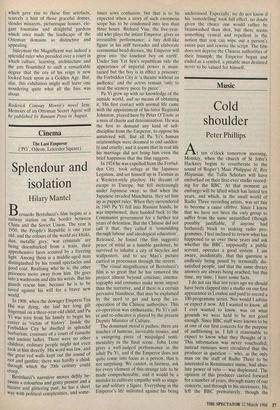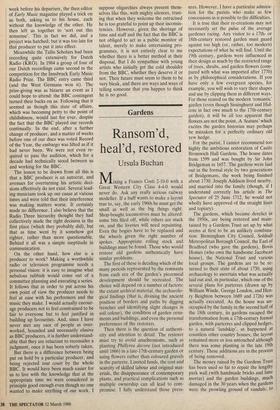Music
Cold shoulder
Peter Phillips
At ten o'clock tomorrow morning, Monday, when the church of St John's Hackney begins to reverberate to the sound of Rogier's Mass Philippus II, Rex Hispaniae, the Tallis Scholars will have embarked on their first-ever studio record- ing for the BBC. At that moment an embargo will be lifted which has lasted ten years, and which, in the small world of Radio Three recording artists, was set fair to become a cause célèbre. Since I know that we have not been the only group to suffer from the same unjustified (though possibly justifiable, if anyone had bothered) block to making radio pro- grammes, I feel inclined to review what has happened to us over these years and ask whether the BBC, supposedly a public servant, operates a •good system. I am aware, incidentally, that this question is endlessly being posed by terminally dis- satisfied people, and that the same dreary answers are always being reached; but this time, my time, I have some facts.
I do not say that ten years ago we should have been clapped into a studio on our first appearance in London and paid to record a 100-programme series. Nor would I advise or expect it now. All I wanted to know, all I ever wanted to know, was on what grounds we were held to be not good enough. Since BBC staff were known to be at one of our first concerts for the purpose of auditioning us, I felt it reasonable to expect to know what they thought of it. This information was never vouchsafed; instead rumours were circulated that the producer in question — who, as the only man on the staff of Radio Three to be interested in Renaissance music, had abso- lute power of veto — was displeased. The opinion of this producer carried forward for a number of years, through many of our concerts, and through to his successors. He left the BBC prematurely, though the week before his departure, the then editor of Early Music magazine played a trick on us both, asking us to his house, each without the knowledge of the other. He then left us together to 'sort out this nonsense'. This in fact we did, and a project was hatched; but it was too late for that producer to put it into effect.
Meanwhile the Tallis Scholars had been recording quite extensively for Dutch Radio (KRO). In 1984 a group of four of our Dutch recordings came second in the competition for the Innsbruck Early Music Radio Prize. The BBC entry came third (and the West Germans won it). The prize-giving was as bizarre an event as I could hope to attend: the BBC contingent turned their backs on us. Following that it seemed as though this state of affairs, which was becoming petty to the point of childishness, would last for ever, despite the fact that the BBC played our records continually. In the end, after a further change of producer, and a matter of weeks before one of our discs was voted Record of the Year, the embargo was lifted as if it had never been. We were not even re- quired to pass the audition, which for a decade had technically stood between us and working for the BBC.
The lesson to be drawn from all this is that a BBC producer is an autocrat, and avenues for overturning his artistic deci- sions effectively do not exist. Several lead- ing musicians took up our cause at various times and were told that their interference was making matters worse. It certainly made no difference. I also believe that the Radio Three hierarchy thought they had collectively made the right decision in the first place (which they probably did), but that as time went by it somehow got righter, rather than more questionable. Behind it all was a simple ineptitude in communication.
On the other hand, how else is a producer to work? Making a worthwhile radio or television programme needs a personal vision: it is easy to imagine what nebulous rubbish would come out of a committee planning and executing a series. It follows that in order to put across his own point of view the producer needs to feel at ease with his performers and the music they make. I would actually encour- age producers not to feel constrained to be fair to everyone but to feel justified in building up favourites. And, since I have never met any race of people as over- worked, hounded and necessarily elusive as BBC producers, it is further understand- able that they are reluctant to reconsider a judgment, once it has been soberly taken.
But there is a difference between being put on hold by a particular producer, and being rejected tout court by the whole BBC. It would have been much easier for us to live with the knowledge that at the appropriate time we were considered in principle good enough even though no one wanted to make anything of our work. I suppose oligarchies always present them- selves like this, with mighty silences, trust- ing that when they welcome the ostracised he is too grateful to point up their inconsis- tencies. However, given the shortage of time and staff and the fact that the BBC is not obliged to act as a public monitor of talent, merely to make entertaining pro- grammes, it is not entirely clear to me whether there is a better method at their disposal. But I do sympathise with young artists who initially get the cold shoulder from the BBC, whether they deserve it or not. Their future must seem to them to be very bleak, and there are ways and ways of telling someone that you happen to think he is no good.



















































 Previous page
Previous page